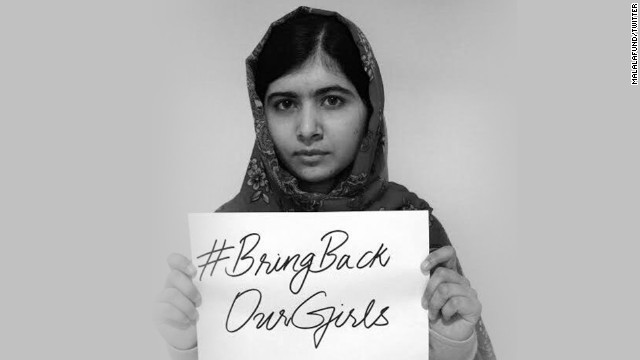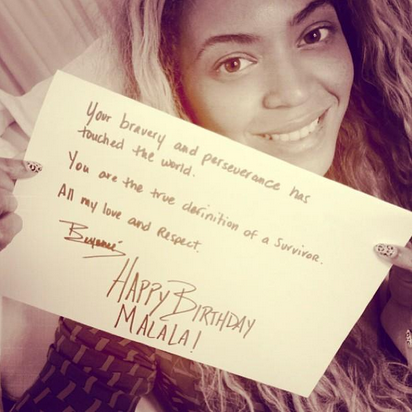Beyonce made the front page of the Washington Post Metro section over the weekend. Under the Vegas-illuminated feminism of the VMAs, the textbook definition of f-word came under fire yet again. And, as importantly, the eternal question of whether Beyonce's woman power message translates into "good" feminism raged on. And on and on, because she's here, and here, and well everywhere. She's got famous Nigerian author Chimamanda Ngozi Adichie featured like the feminist theory hype (wo)man in her new song Flawless. She's hugging Michelle Obama, and perhaps inadvertently helping avowed feminist Hillary Clinton advance to the presidency.


And Beyonce is not the only one. Emma Watson--hard hitting, fast thinking, wunderkind, Hermione--recently followed in the footsteps of UN Goodwill Ambassador Angelina Jolie--most recently evil witch gone women's advocate of Fey. And let's not forget women like Malala Yousafzai.
But, wait a minute, back to Beyonce, right? Because change is the only constant, and like all good things our once-beloved Western feminism is changing. Unlike the first wave of feminism, American women are no longer fighting for basic human rights. And we can, and do, spend a wildly disproportionate amount of time wishing for the good old days of the second wave. The sisterhood, the faked bra burnings, the fight for our bodies, and those with small voices. But, when the third wave began in the 1990s, something new began--a GRRL wave we're still riding today.
Kairos is a nebulous Greek word, meaning something like "timeliness"; and it corresponds to the idea of rhetorical situation, which is something like the set of conditions, both material and ideological, that precede a piece of rhetoric. Ok, so what does this have to do with Beyonce? What does this mean? What does it mean that Beyonce (or Taylor Swift, or Miley Cyrus, or Nicki Minaj) are some of our most vocal feminists? Only that our material and ideological conditions are changing--and the model of GRRL power, now becoming synonymous with pop moguls in spangled body suits, is taking center stage (pun very much intended). Feminism is changing, yet again.
But, so, feminism isn't dead, right? In my estimation, it's very much alive. Our rhetorical conditions are just changing so rapidly that second wave feminists seem to have barely donned their semi-scorched bras before these new feminists are tearing them off in a bombastic show of choice. This may not have been what second wavers were driving at, and it's certainly possible to be critical of today's feminism. But what's more important to note is that American women live under a set of material conditions so vastly improved by first and second wave feminists that our tail end of the third wave is much more concerned with the privilege that is individual identity than with solidarity or, eek, rights. In fact, this photograph is taken from the Gender and Education Association's website, which runs things in the vein of "The Everyday Sexism Project." That project seeks to uncover hidden sexisms in the lives of women. Not suffrage or property ownership or rape or child marriage.
Those struggles feel so far in our distant past that some women (and men) are denying feminism altogether. (And that's a problem, yes. Do we need a new word? Do we need a new movement? A new definition? These are questions for another day.) But, for today, feminism seems to have become a fight for self-definition. Safety, yes. Equality, always. But we are calling ourselves "sluts" en masse. And "bad feminists" and "bitches" and "dykes." It is no small thing to live in the era of self-definition. To busy ourselves with deciding who we are, how we behave, what mantles we take up. This is an amazing time to be a Western feminist. And we can do this, because we live under the large and seemingly impermeable umbrella of post-second wave privilege.
(Some questions we must ponder: What does it mean to be a feminist? Why are some men and women abandoning the term feminist? Do we need to do some resurrection work alongside our revolution? Do feminists need to unite around certain major issues? Should we turn our attention equally to women's issues globally?)
But, so, feminism isn't dead, right? In my estimation, it's very much alive. Our rhetorical conditions are just changing so rapidly that second wave feminists seem to have barely donned their semi-scorched bras before these new feminists are tearing them off in a bombastic show of choice. This may not have been what second wavers were driving at, and it's certainly possible to be critical of today's feminism. But what's more important to note is that American women live under a set of material conditions so vastly improved by first and second wave feminists that our tail end of the third wave is much more concerned with the privilege that is individual identity than with solidarity or, eek, rights. In fact, this photograph is taken from the Gender and Education Association's website, which runs things in the vein of "The Everyday Sexism Project." That project seeks to uncover hidden sexisms in the lives of women. Not suffrage or property ownership or rape or child marriage.
Those struggles feel so far in our distant past that some women (and men) are denying feminism altogether. (And that's a problem, yes. Do we need a new word? Do we need a new movement? A new definition? These are questions for another day.) But, for today, feminism seems to have become a fight for self-definition. Safety, yes. Equality, always. But we are calling ourselves "sluts" en masse. And "bad feminists" and "bitches" and "dykes." It is no small thing to live in the era of self-definition. To busy ourselves with deciding who we are, how we behave, what mantles we take up. This is an amazing time to be a Western feminist. And we can do this, because we live under the large and seemingly impermeable umbrella of post-second wave privilege.
(Some questions we must ponder: What does it mean to be a feminist? Why are some men and women abandoning the term feminist? Do we need to do some resurrection work alongside our revolution? Do feminists need to unite around certain major issues? Should we turn our attention equally to women's issues globally?)


